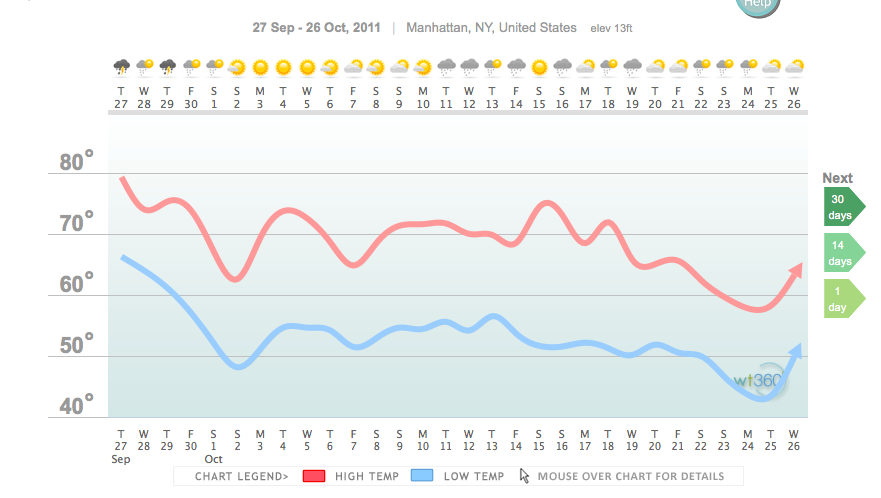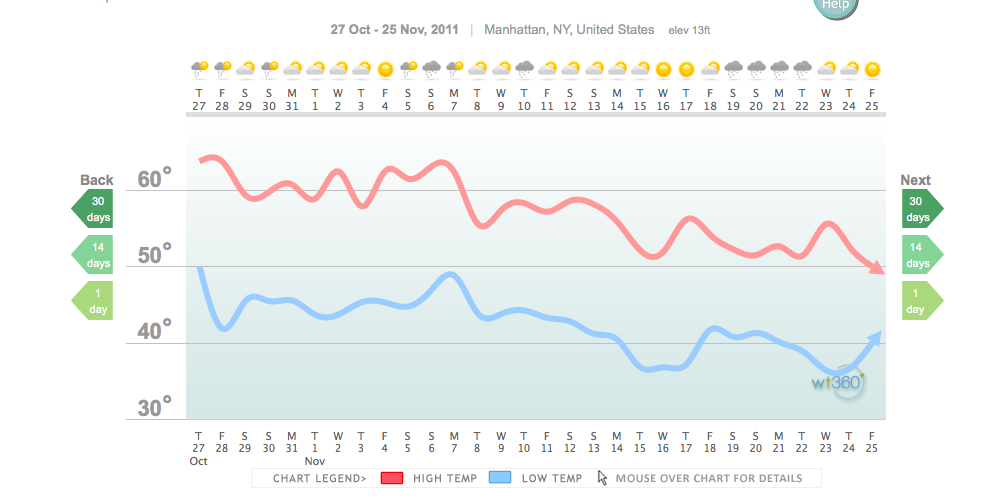An Algorithm that Can Predict Weather a Year in Advance
In our latest podcast, “The Folly of Prediction,” we poke fun at the whole notion of forecasting. The basic gist is: whether it’s Romanian witches or Wall Street quant wizards, though we love to predict things — we’re generally terrible at it. (You can download/subscribe at iTunes, get the RSS feed, or read the transcript here.)
But there is one emerging tool that’s greatly enhancing our ability to predict: algorithms. Toward the end of the podcast, Dubner talks to Tim Westergren, a co-founder of Pandora Radio, about how the company’s algorithm is able to predict what kind of music people want to hear, by breaking songs down to their basic components. We’ve written a lot about algorithms, and the potential they have to vastly change our life through customization, and perhaps satisfy our demand for predictions with some robust results.
One of the first things that comes to mind when people hear the word forecasting is the weather. Over the last few decades, we’ve gotten much better at predicting the weather. But what if through algorithms, we could extend our range of accuracy, and say, predict the weather up to a year in advance? That’d be pretty cool, right? And probably worth a bit of money too.
That’s essentially what the folks at a small company called Weather Trends International are doing. The private firm based in Bethlehem, PA, uses technology first developed in the early 1990s, to project temperature, precipitation and snowfall trends up to a year ahead, all around the world, with more than 80% accuracy. Translation: they gather up tons and tons of data, literally as much historical information on weather around the world as is out there, and then cram it into some 5.5 million lines of proprietary computer code (their algorithm) to spit out weather forecasts up to a year in advance. This is fairly different from what most meteorologists do by modeling the atmosphere. “Only about 15% of what we do is traditional forecast meteorology,” says CEO Bill Kirk, a former U.S. Air Force Captain with a degree from Rutgers in meteorology. Kirk began working on the WTI algorithm while in the Air Force.
Since launching in 2003, WTI has carved out a nice business for itself by marketing weather predictions to a range of clients, from commercial retailers and manufacturers (Wal-Mart, Target, Anheuser-Busch, Johnson & Johnson), to financial services firms and commodity traders– all of whom depend on the weather. Consumption of beer, for example, varies greatly with the temperature. “For every 1 degree hotter it is, Anheuser-Busch sells 1 percent more product,” says Kirk. And since beer is often made and bottled months in advance, the sooner they can know how hot it will be in May, the sooner they can plan accordingly. Unlike a lot of professional predictors, WTI’s business model has a built-in incentive structure: “Our clients are making multi-million dollar decisions based on our forecasts. If we’re not right, they’re not coming back.”
Though a trained meteorologist, Kirk says that over the last several years, he’s learned a lot about what really drives weather. He talks at length about the phenomenon known as Pacific decadal oscillation, which holds that the Pacific Ocean cycles through periods of warm and cold temperatures lasting about 30 years each. From 1976, to roughly 2006, the Pacific was in a warm phase, but is now cooling. Kirk believes that it’s this change that’s behind much of the bizarre weather we’ve seen over the last few years, from record snowfall and tornado activity, to droughts in the South, to floods in Australia. “The PDO cycles used to be a footnote in climate reports,” says Kirk. “Now we see them as playing a prominent role in determining weather patterns.”
Kirk is now trying to market his long-range forecasting to the private sector with a new website, Weathertrends360, as well as a new app. They both allow you to get a day-by-day forecast all the way through August 2012. Here’s his forecast for New York City over the next two months:


Just for kicks, I’ll check in from time to time to see how accurate the WTI forecasts end up being.

Comments